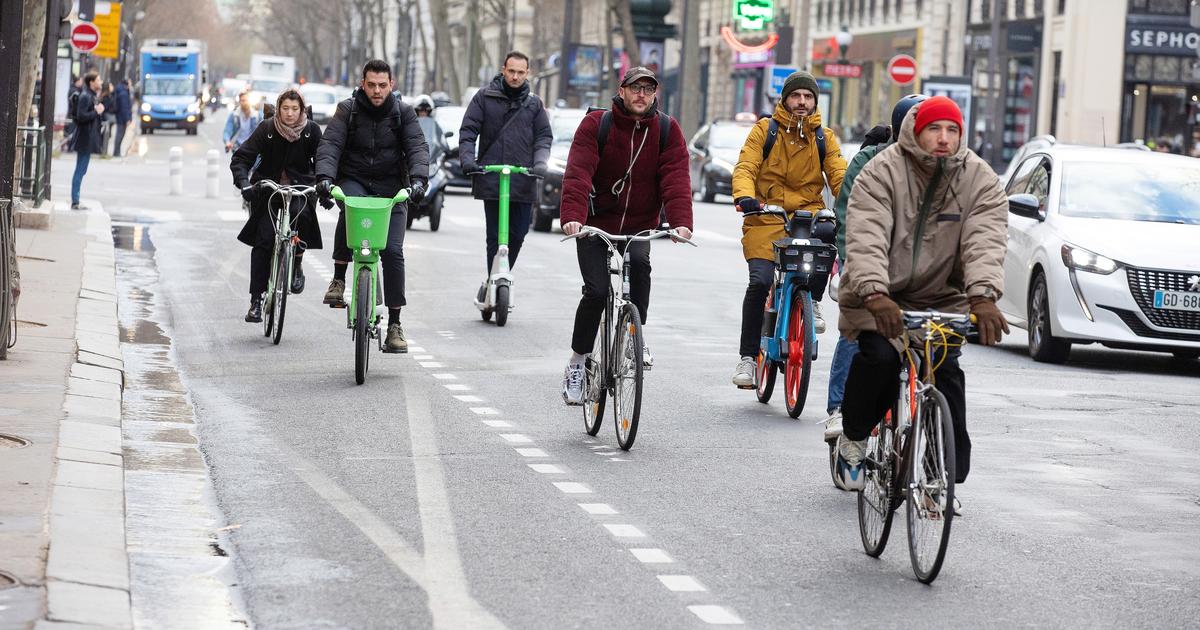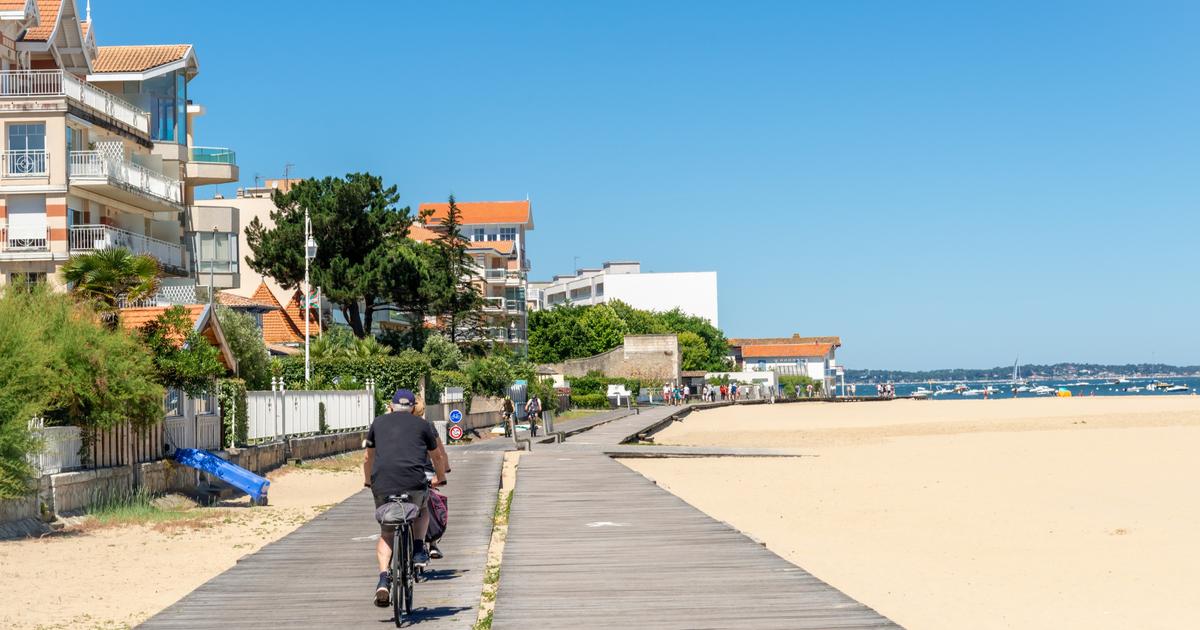In an archive image, several citizens move by bicycle through Paris.MATHIEU MENARD / Hans Lucas via AFP
France will offer a premium of up to 1,500 euros for those who decide to abandon their old and polluting car in favor of an electric bicycle.
The announcement of the Government of Emmanuel Macron comes a week after the French Parliament gave its final approval to the law on climate change that, despite criticism from environmentalists who consider that it does not go far enough, contains innovative measures such as the flight ban when there are alternatives by train of less than two and a half hours.
In Spain, for now, no aid or similar flight bans are foreseen.
More information
France advances to ban internal flights that can be made by train in less than two and a half hours
New cheap tickets to boost the train: Madrid-Barcelona with 18 times less emissions than the plane
“To promote the use of the electric bicycle as an alternative to the individual vehicle and favor the move towards sustainable transport, especially in urban areas and its periphery, the Climate Law extends the premium to the conversion for the purchase of a bicycle from electric assistance or an electric cargo bike in exchange for the delivery of a polluting car or truck for scrapping ", explained in a joint statement those responsible for the Economy and Transport of the Macronista Government.
The maximum premium will be 1,500 euros.
Added to this is the possibility of obtaining a "bicycle voucher" of up to 1,000 euros for the purchase of an electric cargo bike.
"Individuals, local communities, associations or professionals who constitute clean alternatives adapted to urban transport modes" will be able to access this complementary aid.
Although this measure did not appear in the original text of the draft law on “climate and resilience” presented by the Government, an amendment to it was voted unanimously in the National Assembly in mid-April.
Last week, the whole of the normative package received its final approval in the hemicycle.
This type of aid is not yet contemplated in Spain,
reports Miguel Ángel Medina
.
A spokesperson for the Institute for the Diversification and Saving of Energy, under the Ministry of Ecological Transition, explains that the aid program for the purchase of electric vehicles currently in force, called Moves III, "does not include aid for electric bikes or to replace a vehicle for a bicycle ”, but only for cars and vans.
"In any case, within the framework of the Recovery, Transformation and Resilience Plan, other programs will be published that encourage the use of bicycles as a mode of transport."
In fact, the Government presented the first State Bicycle Strategy in June, which includes many proposals to promote the use of bicycles, although for now it does not include concrete aid.
No more short flights if there is an alternative by train
French law also provides for the prohibition of air journeys when there is an alternative by train of less than two and a half hours and which is guaranteed several times a day (although there are exceptions, as in the case of journeys that guarantee connections with other flights). Spain is not considering any similar project, as a spokesman for the Ministry of Transport explains: “In our country, which has one of the most extensive high-speed networks in the world, it has been shown that where both alternatives coexist - plane and high speed -, the transfer of passengers from the air sector to the rail sector has already taken place naturally ”.
In terms of consumption, the French regulation prohibits the advertising of fossil fuels and, from 2028, that of the most polluting vehicles. It also establishes the prohibition, as of 2025, of single-use polystyrene food packaging and establishes the dedication, until 2030, of at least 20% of the sales area of shops of more than 400 square meters to bulk products. As of 2028, it will also be forbidden to rent poorly insulated houses that therefore require high energy costs, which in France are called “thermal strainers”.
Despite the fact that at the beginning of the year several members of the Government criticized the ecologist mayor of Lyon for proposing a menu without meat in school canteens - to speed up the canteen service in times of health crisis - the law now approved also regulates in this subject. In the school canteens there will be a vegetarian menu one day a week and in some locations the possibility of choosing a "daily" vegetarian option will be offered, highlighted the Agence France Presse. As of 2024, in addition, the meat and fish on the menus must be at least 60% of "quality" (although, for now, the standard does not specify what this should translate into) and 50% of the products used Also in the canteens managed by private companies they must be sustainable or fair trade, while 20% must be of organic origin.
Although the Government finally resigned at the beginning of the month to hold, as it had announced, a referendum to introduce into the Constitution a mention of “biodiversity, the environment and the fight against global warming”, the new law provides for the creation of a crime general water and air pollution.
This crime will have the aggravation of "ecocide" when intentionality is established in its commission.
The penalties for ecocide may reach up to ten years in prison and a 4.5 million euro fine.
Ecologist and judicial slap on the wrist
The bill was finally approved on July 20 by 233 votes in favor and only 35 against. Despite their strong support, environmental organizations such as Greenpeace and left-wing MPs criticized the "lack of ambition" of the regulation, which arose from the Citizen Climate Convention convened by Macron and which, between October 2019 and June 2020, brought together 150 citizens chosen by lottery with the aim of “defining a series of measures to achieve a reduction of at least 40% of greenhouse gas emissions by 2030 [compared to 1990] in a spirit of social justice ”. The Convention issued 146 proposals, of which the law finally only includes a part. And that, according to Greenpeace France, have been "empty of substance" and with too "late" implementation dates.
The law "does not allow us to achieve our objectives of reducing greenhouse gas emissions," Céleste Duriez, representative of the NGO Réseau Action Climat, told AFP. The regulation was approved twenty days after the Council of State, the highest administrative court in France, decreed that the French state is not doing enough to reduce greenhouse gases by 40% in 2030 and thus comply with the Paris Agreement against climate change. For this reason, in a decision announced on July 1, it gave it nine months until March 31, 2022, to take “additional” and “useful” measures that guarantee the goals set both internally and internationally.
You can follow CLIMA Y MEDIO AMBIENTE on
and
, or sign up here to receive
our weekly newsletter



/cloudfront-eu-central-1.images.arcpublishing.com/prisa/O5KJZWDZ2ZF3PMFCA7GSGYAIW4.jpg)








/cloudfront-eu-central-1.images.arcpublishing.com/prisa/KMEYMJKESBAZBE4MRBAM4TGHIQ.jpg)


